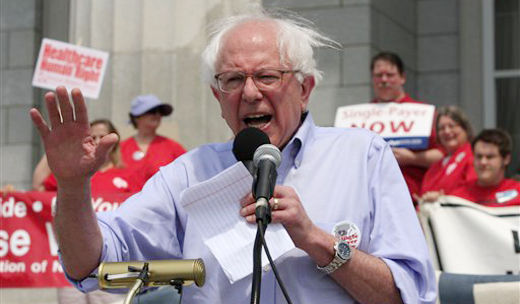
WASHINGTON (PAI) – Is single-payer government-run health care – a key cause for 21 international unions and 500 other labor organizations and a bugaboo for the health insurers and the Radical Right – in the massive health care overhaul Congress approved on party-line votes and President Barack Obama signed?
Its top senatorial proponent, Vermont Independent Bernie Sanders, says the answer is “yes,” even though the words “single payer” aren’t written down. And there are some conditions that must be met before single-payer systems are up and running.
Interviews with Sanders, his staff and some experts in the health care field disclose the law has a provision allowing states, under certain conditions, to establish their own alternative state-run health care systems, starting in 2017.
States would have to get federal waivers to establish their own systems. But within broad guidelines, states could set up whatever they want, including single-payer.
The state alternative systems must meet certain conditions, Sanders’ top health care legislative staffers say. One condition – that all states must in 2014 establish health care “exchanges” to cover those who otherwise are not covered – may make it harder to switch to single-payer, the staffers admit.
After all, they point out, the states would in essence have to establish one system that year, and then tear it down and replace it with another, and that’s heavy lifting for state legislators, the Sanders staffers admit. Sanders is trying to build a coalition to change the date for the alternative systems to 2014, too.
The key requirement states must meet, the staffers say, is that any alternative health care system, including single-payer, “must do as much or more” for health care users “as the existing program does,” referring to the exchanges.
“The idea is that if a state puts together a health care plan – and it could be any type of a plan, including single-payer – as long as they could demonstrate that it would cover as many people, that the coverage would be at least as good, and that it would be at least as affordable, they’d get the waiver from operating the exchange,” Sanders’ top legislative aide told Press Associates Union News Service.
“Then all the tax subsidies” for health care in the overhaul bill “would go to single-payer instead – as long as individuals wouldn’t have to pay more,” he added.
The prospect of being allowed to experiment pushed several states into probing single-payer and other alternatives on their own, before the 2017 date, says Rachel Rosen DeGolia, executive director of Cleveland-based Universal Health Care Action Now, a longtime advocate of single-payer – including single-payer state by state.
Those states include California, Pennsylvania, Vermont and Connecticut:
- In California, the California Nurses Association/National Nurses Organizing Committee – now a large part of 155,000-member National Nurses United – pushed two statewide single-payer bills through the Democratic-run legislature since the start of the decade. Both were vetoed by GOP Gov. Arnold Schwarzenegger.
- Vermont extended its state-run health care system to cover 95% of state residents during the administration of former Democratic Gov. Howard Dean, a physician. Its legislature just approved a measure to study both single-payer and the “public option.”
The public option, which would have put the federal government in competition with the health insurers for covering the uninsured, was dropped from the health care overhaul at the insistence of a “swing” lawmaker, Sen. Joseph Lieberman, Ind.-Conn. Otherwise, he would have voted “no,” killing the bill.
- Ironically, Lieberman’s Connecticut – which houses headquarters of several large insurers – is considering alternatives, too. Faced with threatened huge health insurance rate hikes last year, the Democratic-run legislature passed and GOP Gov. M. Jodi Rell signed a measure to extend the public option there, DeGolia says.
- In Pennsylvania, a bipartisan coalition of 34 state senators signed onto a bill to explore single-payer, and is putting pressure on the state senate’s health committee chairman to hold hearings. That lawmaker is from Pittsburgh, headquarters of the Steelworkers. USW, led by Canadian native Leo Gerard, whose nation got single-payer province by province, is one of the most-outspoken backers of single-payer.
Meanwhile, Ellen Shaffer, a former congressional staffer specializing in health care who now co-heads the Center for Policy Analysis, warns progressives not to sit on their hands this fall, lest the GOP win back Congress – and undo prior progress.
“While we share the long-term goal of a universal ‘Medicare for all’ system, too many on the left are ignoring the important improvements to access and quality of care that the new law will achieve – and the policy space that it creates to go further in the future,” she writes in a recent blog. “Women in particular have important reasons to stay active, including the need to defend new laws that prohibit insurance companies from discriminating against them,” Shaffer adds.
Photo: Senator Bernie Sanders, I-Vt., speaks to a crowd at health care rally in front of the Statehouse in Montpelier, Vt., May 1. Alden Pellett/AP

MOST POPULAR TODAY

High Court essentially bans demonstrations, freedom of assembly in Deep South

Zionist organizations leading campaign to stop ceasefire resolutions in D.C. area

U.S. imperialism’s ‘ironclad’ support for Israel increases fascist danger at home


UN warns that Israel is still blocking humanitarian aid to Gaza






Comments